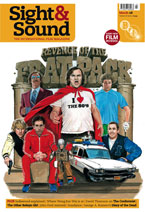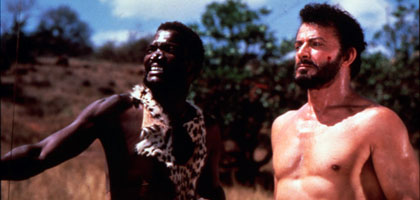
The running man
DVD review: The Naked Prey

The Naked Prey may not be politically correct, but it's a key piece of independent US film-making, says Tim Lucas
Cornel Wilde, USA 1966; Criterion/Region 1; Aspect Ratio 2.35:1; 96 minutes; Features: audio commentary, 1913 account of John Colter's flight from the Blackfoot Indians, soundtrack cues, booklet featuring essay by critic Michael Atkinson and 1970 'Films and Filming' interview with Wilde by Gordon Gow
Actor-producer-director Cornel Wilde may have paid a high historical price when he decided not to take credit as producer of The Big Combo (1955). True, he was the star, but as audio commentator Stephen Prince points out here, the film-noir classic has clung to popular consciousness by virtue of its behind-the-scenes strengths: Joseph H. Lewis' hard-nosed direction, the moody cinematography of John Alton. "But," as he says, "it was Wilde's film."
In 1951 the Hungarian-born Wilde became only the second actor - after Burt Lancaster - to form his own production company, thus declaring himself a herdsman rather than cattle. A man of the world, proficient in six languages, he considered the two-dimensional heroism of most Hollywood films an insult to audiences and he determined to make movies about 'anti-heroes' - men who overcame their personal flaws and conflicts to do the right thing. All but one of his company's eight productions cast him opposite his wife, the pretty but not-so-popular Jean Wallace, and this devotion to his muse may have also worked against his enduring popularity. The one film they did not make together is the one upon which his memory most conspicuously rests: The Naked Prey.
The film was first conceived to tell the story of John Colter, a trapper with the Lewis and Clarke expedition who, in 1809, survived an altercation with Blackfoot Indians in Wyoming by outrunning them into the wilderness after being stripped naked. When Wilde became aware of substantial co-production funds available in South Africa, he and screenwriters Clint Johnston and Don Peters reworked the story into an allegory set in the veldts of South African Zulu country, availing their project of the co-production monies - though the film's intentions and much of its staging were in direct defiance of apartheid.
Wilde plays a safari guide anticipating retirement after one last expedition, which becomes a nightmare when his elephant-hunting client (Gert van den Bergh) refuses, despite his warnings, to accede to a Zulu warrior's (Ken Gampu) demand for tribute, an irrevocable insult to his masculinity and that of his tribesmen. The expedition camp is promptly attacked, its members brutally yet creatively slain in a manner looking forward to the Italian cannibal films of the 1980s. This leaves only the 54-year-old Wilde to be stripped naked - exposing a lean, chiselled body that most men in their twenties would envy - and chased into open country where, in a remarkably vigorous physical performance, he must elude wild animals and his spear-hurling pursuers until he finds his way back to base. Because the Nguni dialect of the tribe isn't subtitled, we - like our hero - fail to grasp all the considerations governing this feature-length test of character. This man's life is indeed on the line but, because he had argued in favour of paying tribute, the tribesmen have given him the chance to survive by proving himself their equal as a warrior.
Criterion's handsome high-definition digital transfer, boasting a tumultuous mono mix and fully revealing the film's Panavision vistas for the first time on video, goes a long way towards promoting The Naked Prey as an important chapter in the history of independent US film-making. It is too often conveniently excluded from that history on several counts: its pulp-style adventure, its plainspoken directorial style, its paucity of dialogue and lack of characterisation through dialogue, its documentary inserts of animal death, the shrill way it was sold to audiences ("A Manhunt of Indescribable Terror and Screaming Suspense!") and above all its unfortunate susceptibility to misinterpretation. That this engrossing adventure is a serious humanistic statement and a plea for concord between races should be obvious; but it also depicts Zulus bullying whites and overreacting to a minor slight with riotous ritualised murder and implied cannibalism (not a Zulu trait), so it may have kept as many racial-tension fires burning in America as it quelled in 1966.
Wilde's keen anthropological eye is attentive to the ways of the Zulu people, but it returns often enough to the bare breasts of the tribeswomen to have made them (and Wilde's own constant state of near-undress) the talk of many a town when the racily titled film was first released. The star's choice of 'Little Brown Jug' as the bonding song he sings to the little girl (Bella Randles) orphaned by Arab slave-hunters has also dated into something too colour-conscious and condescending, though the relationship between them remains affectionate and dignified. Finally, the end credits' identification of Wilde's character as 'The Man' - meant either to humble him in the face of nature or nominate him as an everyman - carries in its capitalised simplicity a whiff of white supremacy.
Most of these problem areas are admirably acknowledged and explored in the commentary by Stephen Prince, a Virginia-based author of numerous books on social themes and savagery in cinema. It's a good instructive listen, pre-scripted yet responsive to specific shots and scenes, though he mistakenly links Joseph H. Lewis to Detour, assigns the wrong year to The Most Dangerous Game, and credits Wilde with some dangerous location stuntwork that, to my eyes, appears to have more sensibly replaced him with a stuntman. Paul Giamatti's four-minute narration of the John Colter story is a pleasure, and the album's worth of soundtrack cues will make the disc a still more tempting purchase for film-music collectors. Michael Atkinson's notes are a forceful defence of a truly hellbent film which, he writes, is "not quite politically correct" but "caring nothing for aesthetics and everything for surviving [its own] experience."
